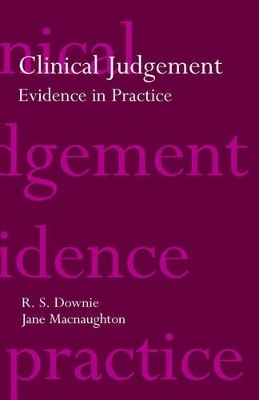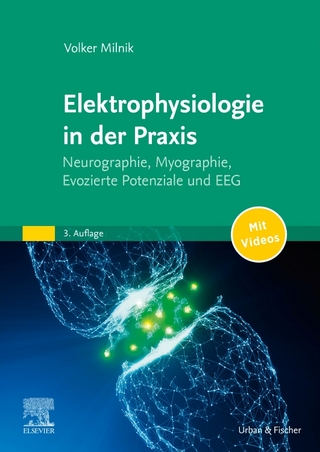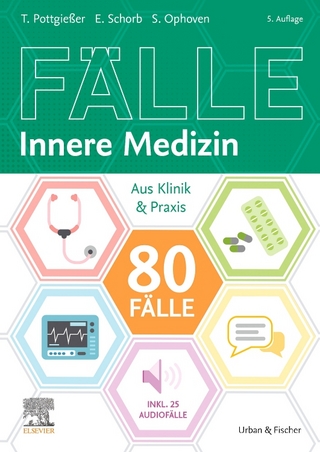
Clinical Judgement
Evidence in Practice
Seiten
2000
Oxford University Press (Verlag)
978-0-19-263216-6 (ISBN)
Oxford University Press (Verlag)
978-0-19-263216-6 (ISBN)
Medical decisions are usually thought to follow from evidence-based science, but this is an oversimplified view. The book investigates the complex nature of evidence in medicine, makes a case for the centrality of clinical judgement, and identifies the elements of good judgement in decisions made in the clinic, in public health, and in resource management.
There is a widespread view that modern medicine is primarily a scientific enterprise and that the decisions of clinicians follow from evidence-based science. In terms of this view the need for clinical judgement is minimal. The aims of this book are to make a case for the centrality and irreplaceability of clinical judgement, to identify the elements of good clinical judgement, and to suggest how these might be developed by using the humanities in medical undergraduate and postgraduate education. The authors argue that good clinical judgement requires both technical evidence and a humane attitude. But technical evidence is not always quantifiable or even scientific; it can be like that of the detective or the literary scholar. A humane attitude involves ethical sensitivity, but also a broad educated perspective which can be derived from the arts. The authors illustrate their argument by examining decisions made by doctors in clinical situations, in public health, and (in a chapter contributed by a hospital consultant) in resource management. About the authors: Robert S. Downie is Professor of Moral Philosophy at Glasgow University since 1969. He is a member of the BMA Ethics Committee and co-editor of the Journal of Medical Ethics. He has published extensively in the field of medical ethics. Jane MacNaughton has recently taken the position of Director of Centre for Arts, Humanities, Health and Medicine at the University of Durham. Previously she was Clinical Lecturer in General Practice at Glasgow University and a part-time GP.
There is a widespread view that modern medicine is primarily a scientific enterprise and that the decisions of clinicians follow from evidence-based science. In terms of this view the need for clinical judgement is minimal. The aims of this book are to make a case for the centrality and irreplaceability of clinical judgement, to identify the elements of good clinical judgement, and to suggest how these might be developed by using the humanities in medical undergraduate and postgraduate education. The authors argue that good clinical judgement requires both technical evidence and a humane attitude. But technical evidence is not always quantifiable or even scientific; it can be like that of the detective or the literary scholar. A humane attitude involves ethical sensitivity, but also a broad educated perspective which can be derived from the arts. The authors illustrate their argument by examining decisions made by doctors in clinical situations, in public health, and (in a chapter contributed by a hospital consultant) in resource management. About the authors: Robert S. Downie is Professor of Moral Philosophy at Glasgow University since 1969. He is a member of the BMA Ethics Committee and co-editor of the Journal of Medical Ethics. He has published extensively in the field of medical ethics. Jane MacNaughton has recently taken the position of Director of Centre for Arts, Humanities, Health and Medicine at the University of Durham. Previously she was Clinical Lecturer in General Practice at Glasgow University and a part-time GP.
Chapter 1: Judgement and Science ; Chapter 2: Judgement in the clinic ; Chapter 3: Humane Judgement ; Chapter 4: Judgement in public health ; Chapter 5: Judgement and resource management ; Chapter6: Educating judgement: the humanities ; Conclusion: Clinical Judgement ; References
| Erscheint lt. Verlag | 23.3.2000 |
|---|---|
| Verlagsort | Oxford |
| Sprache | englisch |
| Maße | 138 x 216 mm |
| Gewicht | 262 g |
| Themenwelt | Medizin / Pharmazie ► Medizinische Fachgebiete ► Medizinethik |
| Studium ► 2. Studienabschnitt (Klinik) ► Anamnese / Körperliche Untersuchung | |
| Studium ► Querschnittsbereiche ► Geschichte / Ethik der Medizin | |
| ISBN-10 | 0-19-263216-7 / 0192632167 |
| ISBN-13 | 978-0-19-263216-6 / 9780192632166 |
| Zustand | Neuware |
| Haben Sie eine Frage zum Produkt? |
Mehr entdecken
aus dem Bereich
aus dem Bereich
Neurographie, Myographie, Evozierte Potenziale und EEG
Buch | Softcover (2024)
Urban & Fischer in Elsevier (Verlag)
58,00 €
aus Klinik und Praxis
Buch | Softcover (2023)
Urban & Fischer (Verlag)
42,00 €
Buch | Hardcover (2017)
Hogrefe (Verlag)
60,00 €


